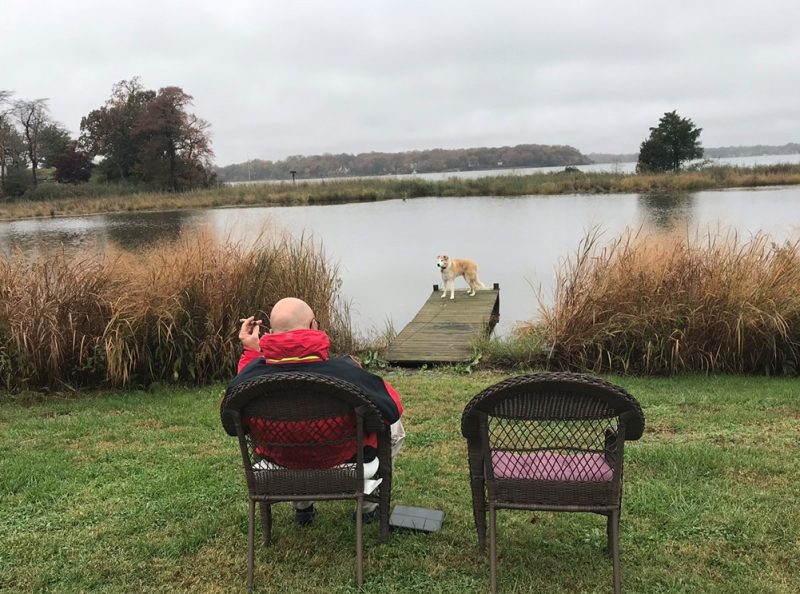How a Clinical Trial Brought Meaning and Hope to Our ALS Fight
For Juliet Taylor's late husband, Jeff, participating in a drug trial was a way to give to others
Written by |

After my husband, Jeff, died from ALS in 2020, I found a video he’d taken by mistake right around the time of his diagnosis. He’d left his phone on and unintentionally recorded three minutes of his expression while sitting in our yard in the November cold, drawing on a cigar and staring, squinting, at the water.
Watching it later, I recognized the concern on his face. The video gave me a glimpse into his rarely shown fear. I yearned to be in that long-ago moment to offer him hope. But what would I have said?
Jeff and I sat by the water’s edge often in the early days of his illness, sometimes together and sometimes alone. We processed ALS in two weathered wicker chairs that sat side by side, our dog, Rudder, at our feet. We talked, but there was no reassurance beyond, “Your life matters so deeply. We’re in this together. I’m here for you.”
Hope came, though, just after Christmas. Through a coincidence of timing and luck, Jeff was offered a place in a clinical trial just two months after his diagnosis. We’d heard that clinical trials offered great promise, but were hard to find and even harder to get into. This one seemed like a lifeline.

Jeff and Rudder rest by the water during the week of his ALS diagnosis in 2018. (Photo by Juliet Taylor)
Guarding a box of medication in my lap, I felt grave responsibility as Jeff drove us home from our first trial appointment a few weeks after he enrolled. It was the exact size of our wedding cake box and felt full of promise.
The box was actually filled with tidy, individual foil packets that contained either a placebo or the investigational drug itself, something we wouldn’t know while he was in this phase of the trial, and still don’t. But after five months of participation, Jeff exercised the option to continue in the study through open-label extension, taking the active drug itself.
Jeff affectionately named the drug “Stink Drink” because it tasted terrible, but he loved being part of the trial. A retired Bureau of Alcohol, Tobacco, Firearms, and Explosives agent, he’d made a career of protecting people, and volunteering in this study felt like a way to keep doing so, his contribution toward a cure.
As for me, mixing the packet of powder with water for him each morning and night made me feel helpful and competent. Stink Drink brought purpose along with hope. It became part of the rhythm of our days.
We also enjoyed the added time with his care team, thanks to appointments required by the study. Normally reserved with all but his closest friends and family, Jeff fell in love with his team of nurse practitioners, researchers, and physical therapists. He knew their dogs’ names, where they went to school, and their outside interests. Even though the trial was double-blind — meaning neither the investigators nor the patients know whether the patients were receiving a placebo or the investigational drug — it felt like we were all invested in it working.
Stink Drink also brought, in our opinion, good physical results. Jeff’s case of ALS was aggressive, but we both noticed long plateaus during which he experienced little or no disease progression. Aside from the taste, he felt no side effects.
To the mountaintop
It’s impossible for me or anyone else to know the precise number of additional minutes, hours, and days that Jeff got from the trial drug or any other intervention we undertook. I do know, however, what he did with that time.
He persuaded a rafting company to let us float down the gentle rapids of the Athabasca River in Jasper, Alberta, Canada, even though he could no longer walk. That same week, we put his scooter in a gondola and soared, hanging from a cable, to the top of a mountain.
He saw the Rolling Stones, Queen, and Bob Seger play live one more time.
On a private tour of the iconic University of Michigan football stadium, he raced his brother Steve the length of the empty field in his powerchair while light snow fell around them both. That was the same week we lived in his sister Janet’s dining room, laughing with family until our faces hurt. And it was the same week he learned he was going to be a grandfather. He declared it, more than once, the best week of his life.
And importantly, he used his time to make his mark on ALS, to leave something behind for others, to make an impact on a disease that often is bereft of hope.
On Sept. 7, the U.S. Food and Drug Administration (FDA) held a second advisory committee meeting on Amylyx Pharmaceuticals’ investigational therapy AMX0035, based on data from a trial that included Jeff and 136 other patients. The committee voted 7-2 for its approval. An FDA decision is expected by Sept. 29.
Note: ALS News Today is strictly a news and information website about the disease. It does not provide medical advice, diagnosis, or treatment. This content is not intended to be a substitute for professional medical advice, diagnosis, or treatment. Always seek the advice of your physician or other qualified health provider with any questions you may have regarding a medical condition. Never disregard professional medical advice or delay in seeking it because of something you have read on this website. The opinions expressed in this column are not those of ALS News Today or its parent company, Bionews, and are intended to spark discussion about issues pertaining to ALS.







Shawn Sarbacker
Just finished my own now approved "Stink Drink" (aptly named). I believe strongly it is slowing my progression and know it is giving me hope. My thanks to Jeff and you for that!